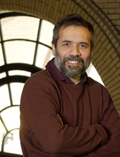
 |
|
||||||||||
Keynote Speakers
Keynote speakers will include:
|
Ashish Arora. Carnegie Mellon University - Heinz School |
Dick Simmons. Texas A&M University. |
Ashish Arora (Heinz School, Carnegie Mellon University and Fuqua School of Business, Duke University)
Title
From Underdogs to Tigers: The rise of the software industry in emerging countries
Abstract:
The rise of the software industy in emerging regions such as India is well known. Less well understood are the causes. Some see it as as the result of simple cost arbitrage. Other accounts see a challenge to the technical supremacy of the West, especially the United States, in software. In this talk I shall describe the commonalities and differences in the experiences of various emerging economies. The Indian case represents an example of innovative response to an opportunity. The innovation represented by the Indian case is process and business innovation, rather than purely technical. Simply put, Indian firms appear to have developed ways to make use of a large pool of talented but poorly trained and inexperienced software developers, developing software for distant customers. In some ways, this is analgous to the changes experienced in manufacturing in the last century.
Short biography:
Ashish Arora is Professor of Economics and Public Policy in the Heinz School. He served as a co-director of the Software Industry Center at Carnegie Mellon University till 2006. He is on the editorial board of six academic journals, and has served on a number of committees for bodies such as the National Academy of Sciences and the Association of Computing Machinery.
Arora's research focuses on the economics of technology and technical change. His research interests include the study of technology intensive industries such as software, biotechnology and chemicals, the role of patents and licensing in promoting technology startups, and the economics of information technology. His work has been published in journals such Management Science, Research Policy, Strategic Management Journal, Journal of Industrial Economics, The Journal of Industrial Economics and Journal of Economic Behavior and Organization. His recent book is on the growth of the software industries in emerging economies: From Underdogs to Tigers? The Rise and Growth of the Software Industry in Brazil, China, India, Ireland, and Israel, (edited with Alfonso Gambardella), Oxford University Press, February, 2005.
Dick Simmons. (Texas A&M University).
Title
Software Engineering: Past, Present, and Future
Abstract:
Software engineering was created during the second half of the 20th century. Demand for computer and software engineers exceeds demand for older engineering areas but universities have fallen behind in meeting this demand. There is a push-back by university professors to include the latest software solutions into the classroom. Job demand will be described for all engineering degrees and for computer science degrees. With the beginning of the 21st century, the software development paradigm has changed resulting in declining demand for computer scientists and increased demand for engineers. The trends in engineering education will be explained contrasting university degrees with certificates, on-campus with distance learning courses, and science with engineering curricula. Effect of globalization on engineers and scientists will be discussed along with a discussion of future job demand.
Short biography:
Dick Simmons is professor emeritus at the department of computer science, Texas A&M University, 1976 - present. He is director and Co-PI, Shared Software Infrastructure Program, from 2004 - present. He was president of Software Commercialization and Innovation Center, Inc., 2001-2003. His award includes IEEE Third Millennium Medal 2000, IEEE Golden Core Member 1996, IEEE Fellow 1988, IEEE Computer Society Distinguished Service Award 1987 and IEEE Centennial Medal 1984.



